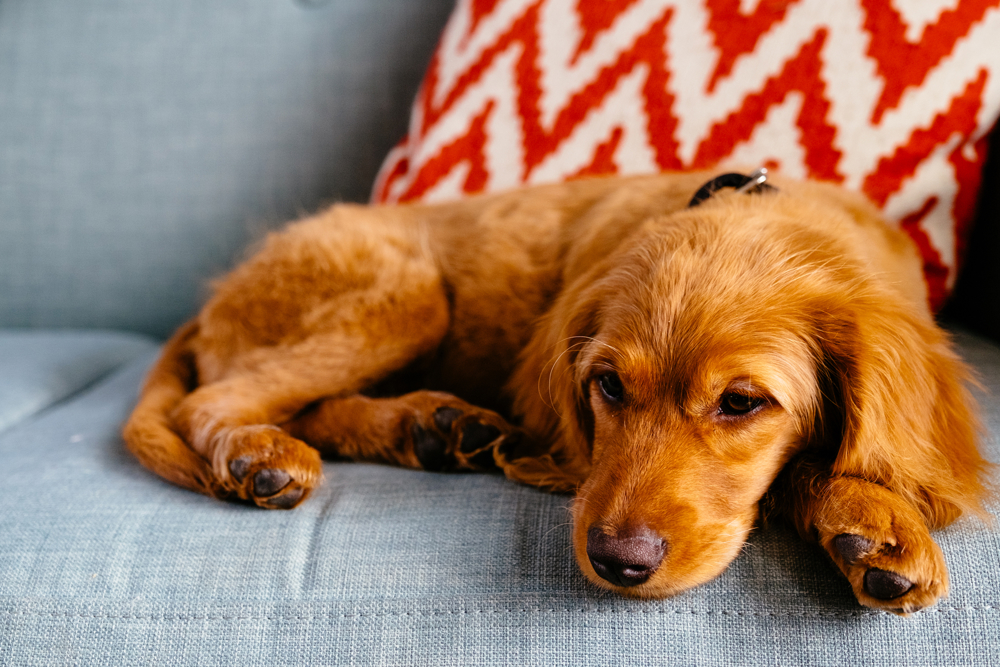
Constipation is a problem that is likely to affect most dogs at some point in their lifetime. We all know how uncomfortable constipation can be, so knowing what signs to look out for, what you can do at home to manage it and when to speak to your vet, can all help to keep your dog feeling healthy and happy.
A summary of constipation
Constipation can affect all types of dogs, but it can usually be managed by appropriate treatment. It can also be preventable, so ensure your dog has:
- Plenty of water
- Regular exercise
- A balanced and appropriate diet
If you’re concerned about your dog’s health, or think their gut may be blocked always speak to your vet.
How do I know if my dog is constipated?
Most owners will quickly notice when their dog is constipated. Taking your dog for daily walks to do a poo means that it’s much easier to notice when something is not quite right. If your dog has not had a poo within 24 hours then it’s certainly possible that they are constipated.
Common signs of constipation include:
- Small, hard and dry stools
- Finding it difficult to poo
- Passing mucus, or sometimes blood
- Tense, hard abdomen
- Occasionally they may be off their food
Why is my dog constipated?
There’s a huge number of possible reasons why your dog may be constipated. These can include:
- Eating something that has caused a blockage
- Eating things that are difficult to digest, such as grass or hair
- Not drinking enough water
- Not getting enough exercise
- Not having enough fibre (or having too much)
- Medical problems, such as hernias, blocked anal glands, some neurological disorders, or some tumours
- Age – older dogs tend to become constipated more easily
- Side effects from some medications
My dog is constipated - when should I call the vet?
It’s a good idea to call your vet for advice as soon as you suspect that your dog is constipated. Your vet may give you some advice on how you can help your dog at home, or they may suggest that you bring your dog in to the practice to be assessed.
If your dog shows other signs that you are concerned about, or you think they may have swallowed something that is causing a blockage, then you should call your local veterinary practice immediately.
How can I help my constipated dog?
It’s always a good idea to check with your local vet about the best way to help your dog, but your vet may suggest some of the following:
Keep them well hydrated
Always ensure your dog has access to fresh water. You could try feeding a wet food rather than a dry food.
Keep them active
Giving your dog regular exercise can sometimes help a constipated dog. It’s obviously a good idea to take them for frequent walks, but you could also try throwing a ball or a range of other canine activities.
Diet
Giving your dog a regular feeding pattern can help to keep their bowels regular too. The type of food you give can also be a key factor in avoiding or easing constipation. Fibre plays a big part in this, and it’s important to feed them the right amount, as too much or too little fibre can also cause digestive problems. If you’re thinking of changing your dog’s diet it’s always a good idea to speak to your vet for advice first.
If you do switch foods remember to do this gradually, so as not to upset your dog's stomach. Start off by mixing in small amounts of the new food into your dog’s regular food, gradually increasing the amount over a period of 7-10 days.
Things not to do if your dog is constipated
If your dog is constipated you should never:
- Give an enema
- Give Milk – many dogs are lactose intolerant
- Give a laxative, unless prescribed by a vet
Find out more
Article author
Think your dog may be affected?
If you're worried about your dog's health, always contact your vet immediately!
We're not a veterinary organisation and so we can't give veterinary advice, but if you're worried about any of the issues raised in this article, please contact your local vet practice for further information.
